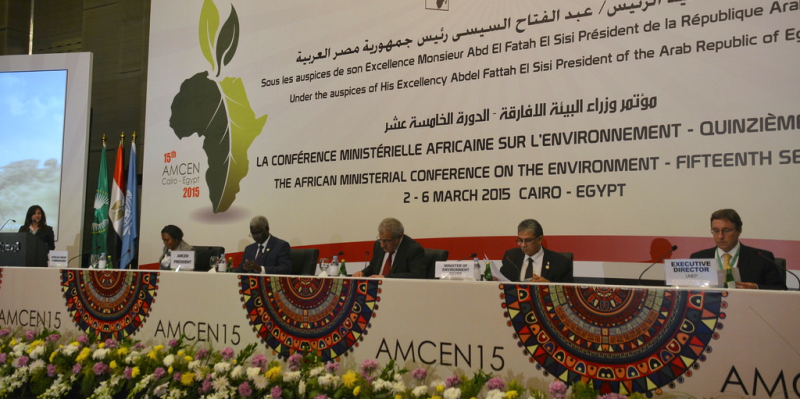
Ministers and delegates from 54 African nations met in Cairo March 2-6, 2015 at the 15th Session of the African Ministerial Conference on the Environment (AMCEN), where they agreed to optimize the use of the continent’s abundant natural resources for sustainable development and poverty alleviation.
The Cairo Declaration also reaffirmed their desire to reach a binding climate change agreement that reflects the continent's priorities and aspirations at the United Nations’ Climate Conference in Paris (COP21) later this year.
"We need to step up regional and national efforts and to consider natural capital valuation in decision-making in order to harness the full potential of Africa's rich endowments and to employ the competitive advantage offered as an engine for inclusive economic growth," said AMCEN President and Minister of Environment of Egypt, Dr. Khaled Fahmy.
Africa, the world's second-largest continent, holds a huge proportion of the world's natural resources, both renewable and non-renewable. According to the African Development Bank, Africa holds 65 per cent of the world's arable land, 10 percent of internal renewable fresh water sources, about 30 percent of the world's mineral reserves, and 12 percent of oil reserves.
Ecosystem services provided by these resources, such as water regulation, fertile soils for food production, carbon sequestration, and biodiversity, underpin Africa's economic sectors like energy, tourism and agriculture.
“The English words ecosystem and economy share the same root in ancient Greek–oikos, which means household. Yet, in the modern world, we have somehow gotten away from this. All actors need to understand the integrated nature of ecosystems and economic systems, all actors need to intervene to manage them as one system, much as we would manage our own household. This is how we will achieve environmental security, climate security, water security and food security,” said Husam Abudagga, acting head of the World Bank office in Egypt, in his address at the conference.
Steve Danyo, a senior natural resource management specialist based in the World Bank office in Addis Ababa, Ethiopia, who participated at the conference, said it provided a good opportunity to engage with ministries of finance on natural capital and to build and expand on existing coalitions around the topic. “We agreed that it is critical for countries to invest in their wealth. There was enthusiasm for measuring natural capital to effectively manage it,” said Danyo.
The first section of the Declaration includes 18 points addressing Africa’s natural capital including:
- To acknowledge the important contribution of the Gaborone Declaration for Sustainability in Africa in pursuing sustainable development and implementing the African Green Economy Partnership Regional Flagship Programme of the African Ministerial Conference on the Environment;
- To agree to increase productivity in the use of natural resources in enhancing economic and social benefits for poverty reduction, job creation and sustainable development;
- To recommend that the status of natural capital in national planning and financing be elevated to that of strategic national resources and be managed and used in that context in order to secure its sustainability and contribution to economic development and environmental stability;
- To agree to support activities on marine ecosystems, the development of marine spatial planning and area-based planning, marine protected areas and valuation and natural capital accounting tools in collaboration with regional seas programmes, the Intergovernmental Oceanographic Commission of the United Nations Educational, Scientific and Cultural Organization, the Food and Agriculture Organization of the United Nations and regional fisheries management organizations.
In addition to addressing natural capital, the declaration also covered a wide range of priorities for African countries, including climate change, the illegal trade in wildlife, the integration of the inclusive green economy across sectors, and the post-2015 development agenda.
